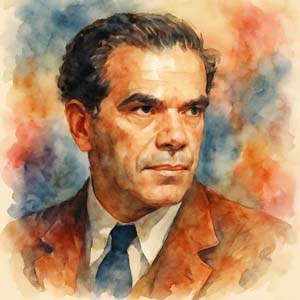— Frank Capra
 Frank Capra (1897–1991), Hollywood film director, was born in Bisacquino, Sicily, and moved to Los Angeles with his family in 1903. A champion of the “common man,” Capra directed feel-good movies during the 1930s and 1940s that have become enduring classics.
Frank Capra (1897–1991), Hollywood film director, was born in Bisacquino, Sicily, and moved to Los Angeles with his family in 1903. A champion of the “common man,” Capra directed feel-good movies during the 1930s and 1940s that have become enduring classics.
“I made some mistakes in drama,” he reflected. “I thought the drama was when the actors cried. But drama is when the audience cries.”
After serving as an instructor in World War I, Capra made his first feature Tramp, Tramp, Tramp in 1926. “Compassion is a two-way street,” he said.
As America emerged from the Depression, Capra understood the struggles of everyday people. His films offered simplicity, humor, and values, with rich characterizations and uplifting messages. He won Oscars for It Happened One Night (1934), Mr. Deeds Goes to Town (1936), and You Can’t Take It With You (1938).
Capra also directed Mr. Smith Goes To Washington (1939) and the timeless holiday favorite It’s A Wonderful Life (1946), celebrating the triumph of honesty over greed, and reminding us why it’s good to be alive.
He worked with stars like Gary Cooper, Jean Arthur, Barbara Stanwyck, Jimmy Stewart, Clark Gable, and Claudette Colbert to deliver performances full of strength and heart.
“There are no rules in filmmaking. Only sins,” Capra once said. “And the cardinal sin is dullness.”
Later in life, he became a passionate advocate for artistic control, helping found the Directors’ Guild and serving as its first president.
His films remind us: it’s still a wonderful life.
 Let your creativity speak… and trust what you hear.🎥💫
Let your creativity speak… and trust what you hear.🎥💫
